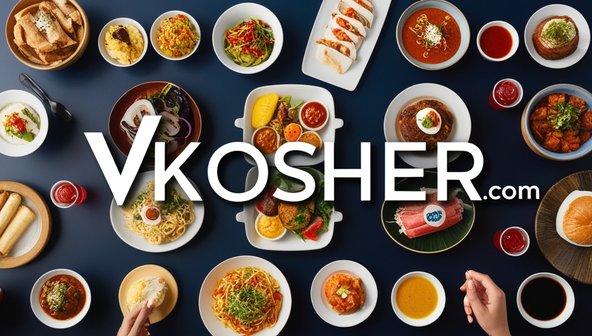Exploring Kosher Dining Options: What's Open Now
When it comes to finding kosher dining options that are open now, the task can sometimes feel challenging, especially if you're not familiar with the area or the specific dietary requirements of kosher food. Whether you are observing Jewish dietary laws or simply seeking out kosher cuisine for its quality and tradition, knowing where and how to find kosher restaurants, cafes, and food establishments that are currently open is crucial. This content will guide you through the essentials of kosher dining, the variety of options available, and how to locate establishments that meet your needs at any time of the day or night.
Understanding Kosher: The Basics
Kosher, derived from the Hebrew word "kashér," meaning "fit" or "proper," refers to foods that meet the dietary laws of kashrut, which are derived from the Torah. These laws outline what can be eaten and how it must be prepared. The key principles include the prohibition of certain animals (like pork and shellfish), the separation of meat and dairy, and specific slaughtering practices. Kosher certification is often required to ensure that food products meet these religious standards.
The Appeal of Kosher Dining
For many, kosher food is more than just a religious obligation; it represents a commitment to quality, ethics, and tradition. Kosher kitchens are known for their strict hygiene and food safety standards. This appeals not only to those who observe Jewish dietary laws but also to individuals who prioritize food safety and quality in their dining choices. The popularity of kosher food has extended beyond the Jewish community, with many people seeking out kosher establishments for the perceived higher standards of cleanliness and preparation.
Finding Kosher Restaurants Open Now
The demand for kosher dining options has led to an increase in the availability of kosher-certified establishments. Whether you're in a bustling city or a quieter suburb, chances are you can find a kosher restaurant open now. The key is knowing where to look and understanding the different types of kosher certifications that may be present in these establishments.
Exploring the Variety of Kosher Cuisine
Kosher dining offers a rich variety of cuisines from around the world, all prepared according to Jewish dietary laws. Whether you're in the mood for traditional Jewish fare or something more contemporary, kosher restaurants offer an array of options that cater to diverse tastes and preferences.
Challenges and Considerations
While the availability of kosher food has expanded, there are still some challenges to consider when seeking out kosher restaurants, especially those that are open now. One of the main challenges is the observance of Shabbat and Jewish holidays, during which many kosher establishments close to observe religious practices.
The Future of Kosher Dining
The kosher food industry continues to grow, with new restaurants, food products, and services emerging regularly. The demand for high-quality, ethically prepared kosher food is not limited to the Jewish community but extends to a broader audience that values the principles behind kosher certification. As more people become interested in healthy, clean, and responsibly sourced food, kosher dining is likely to continue its expansion.
In the future, we can expect to see more kosher restaurants with extended hours, offering a wider variety of cuisines and dining experiences. The integration of technology, such as online ordering and delivery services, will make it even easier to access kosher food at any time. Additionally, as the kosher industry embraces innovation, we may see the development of new kosher food products that cater to modern tastes and dietary preferences, such as plant-based or gluten-free kosher options.
Conclusion
Whether you're a longtime observer of kosher dietary laws or someone who is simply interested in exploring kosher cuisine, finding a kosher restaurant that is open now is easier than ever. With a growing number of kosher establishments, a variety of cuisines to choose from, and the convenience of modern technology, kosher dining is more accessible and diverse than ever before. The key is to know where to look, understand the basics of kosher certification, and be mindful of the unique challenges that come with kosher dining. By doing so, you can enjoy delicious, high-quality kosher food whenever the craving strikes.
When it comes to finding kosher dining options that are open now, the task can sometimes feel challenging, especially if you're not familiar with the area or the specific dietary requirements of kosher food. Whether you are observing Jewish dietary laws or simply seeking out kosher cuisine for its quality and tradition, knowing where and how to find kosher restaurants, cafes, and food establishments that are currently open is crucial. This content will guide you through the essentials of kosher dining, the variety of options available, and how to locate establishments that meet your needs at any time of the day or night.
Understanding Kosher: The Basics
Kosher, derived from the Hebrew word "kashér," meaning "fit" or "proper," refers to foods that meet the dietary laws of kashrut, which are derived from the Torah. These laws outline what can be eaten and how it must be prepared. The key principles include the prohibition of certain animals (like pork and shellfish), the separation of meat and dairy, and specific slaughtering practices. Kosher certification is often required to ensure that food products meet these religious standards.
The Appeal of Kosher Dining
For many, kosher food is more than just a religious obligation; it represents a commitment to quality, ethics, and tradition. Kosher kitchens are known for their strict hygiene and food safety standards. This appeals not only to those who observe Jewish dietary laws but also to individuals who prioritize food safety and quality in their dining choices. The popularity of kosher food has extended beyond the Jewish community, with many people seeking out kosher establishments for the perceived higher standards of cleanliness and preparation.
Finding Kosher Restaurants Open Now
The demand for kosher dining options has led to an increase in the availability of kosher-certified establishments. Whether you're in a bustling city or a quieter suburb, chances are you can find a kosher restaurant open now. The key is knowing where to look and understanding the different types of kosher certifications that may be present in these establishments.
- Urban Centers: Major cities with large Jewish populations, such as New York, Los Angeles, and Miami, are home to numerous kosher restaurants. These cities often have kosher eateries open late or even 24/7 to accommodate both locals and visitors. In New York City, for example, neighborhoods like Borough Park and the Upper West Side are renowned for their extensive selection of kosher dining options, many of which cater to late-night cravings.
- Suburban and Rural Areas: While urban centers are a haven for kosher food lovers, suburban and rural areas can sometimes pose a challenge. However, with the growing demand for kosher food, many suburban communities have seen a rise in kosher delis, bakeries, and even full-service restaurants. These establishments often have extended hours on weekends or during Jewish holidays to cater to the needs of the community.
- Online Directories and Apps: In today's digital age, finding kosher restaurants that are open now has never been easier. Numerous apps and online directories are dedicated to locating kosher eateries. Apps like Kosher GPS, Shabbat.com, and the OU Kosher App allow users to search for kosher restaurants, supermarkets, and even kosher-certified products. These tools are particularly useful when traveling or when you need to find a place to eat outside of your usual neighborhood.
- Supermarkets and Convenience Stores: For those who need a quick kosher snack or meal, many supermarkets and convenience stores offer kosher-certified products that are available around the clock. In areas with significant Jewish populations, supermarkets like Whole Foods and Trader Joe's often have dedicated kosher sections with pre-packaged meals, snacks, and beverages. These are excellent options when you need something quick and don't have time for a sit-down meal.
Exploring the Variety of Kosher Cuisine
Kosher dining offers a rich variety of cuisines from around the world, all prepared according to Jewish dietary laws. Whether you're in the mood for traditional Jewish fare or something more contemporary, kosher restaurants offer an array of options that cater to diverse tastes and preferences.
- Traditional Jewish Cuisine: Many kosher restaurants specialize in traditional Jewish dishes such as matzo ball soup, challah bread, brisket, and kugel. These dishes are often associated with Jewish holidays and celebrations but can be enjoyed year-round at kosher delis and diners. Bagel shops offering lox and cream cheese, knishes, and latkes are also popular and can often be found open early in the morning for breakfast.
- Middle Eastern and Mediterranean: Kosher cuisine also includes a variety of Middle Eastern and Mediterranean dishes, such as falafel, hummus, shawarma, and grilled kebabs. These foods are popular in kosher restaurants, especially in areas with large Sephardic Jewish communities. Many of these establishments are known for their late-night hours, making them a great option for those seeking a kosher meal after dark.
- International Flavors: The globalization of kosher food has led to the emergence of kosher restaurants offering international cuisines, including Italian, Chinese, Mexican, and Indian. These restaurants adhere to kosher guidelines while providing authentic flavors from around the world. Pizza parlors, sushi bars, and taco shops with kosher certification are increasingly common, offering a wide range of options for kosher diners.
- Modern and Fusion Cuisine: In recent years, there has been a trend towards modern and fusion kosher cuisine. Chefs in kosher restaurants are experimenting with new flavors, techniques, and presentations while still adhering to the principles of kashrut. This has resulted in a new wave of kosher fine dining establishments that rival any non-kosher restaurant in creativity and quality. These restaurants are often located in trendy neighborhoods and are open late, catering to a sophisticated clientele.
Challenges and Considerations
While the availability of kosher food has expanded, there are still some challenges to consider when seeking out kosher restaurants, especially those that are open now. One of the main challenges is the observance of Shabbat and Jewish holidays, during which many kosher establishments close to observe religious practices.
- Shabbat: From Friday evening to Saturday evening, observant Jews refrain from work, including the operation of businesses. As a result, many kosher restaurants close for Shabbat. However, some may offer pre-prepared meals that can be ordered in advance or delivered before Shabbat begins. In larger cities, it's possible to find kosher restaurants that remain open during Shabbat, catering to non-observant Jews or those who require kosher food for other reasons.
- Jewish Holidays: During major Jewish holidays such as Passover, Rosh Hashanah, and Yom Kippur, kosher restaurants may have limited hours or close entirely. It's important to check in advance if you plan to dine out during these times. Some establishments may offer special holiday menus or catering services, providing a convenient option for those observing the holidays.
- Kosher Certification: Not all kosher certifications are created equal. Different certifying agencies may have varying standards and guidelines. When choosing a kosher restaurant, it's essential to look for reputable certifications from agencies like the Orthodox Union (OU), Star-K, or OK Kosher. These certifications ensure that the food meets strict kosher standards.
The Future of Kosher Dining
The kosher food industry continues to grow, with new restaurants, food products, and services emerging regularly. The demand for high-quality, ethically prepared kosher food is not limited to the Jewish community but extends to a broader audience that values the principles behind kosher certification. As more people become interested in healthy, clean, and responsibly sourced food, kosher dining is likely to continue its expansion.
In the future, we can expect to see more kosher restaurants with extended hours, offering a wider variety of cuisines and dining experiences. The integration of technology, such as online ordering and delivery services, will make it even easier to access kosher food at any time. Additionally, as the kosher industry embraces innovation, we may see the development of new kosher food products that cater to modern tastes and dietary preferences, such as plant-based or gluten-free kosher options.
Conclusion
Whether you're a longtime observer of kosher dietary laws or someone who is simply interested in exploring kosher cuisine, finding a kosher restaurant that is open now is easier than ever. With a growing number of kosher establishments, a variety of cuisines to choose from, and the convenience of modern technology, kosher dining is more accessible and diverse than ever before. The key is to know where to look, understand the basics of kosher certification, and be mindful of the unique challenges that come with kosher dining. By doing so, you can enjoy delicious, high-quality kosher food whenever the craving strikes.




